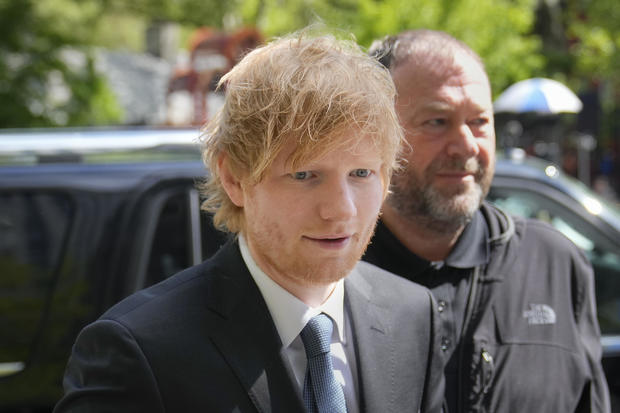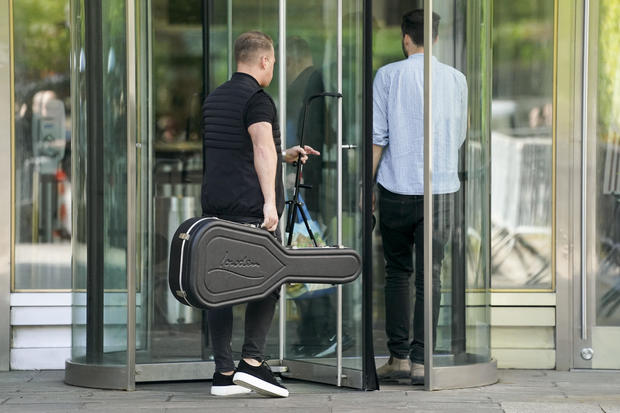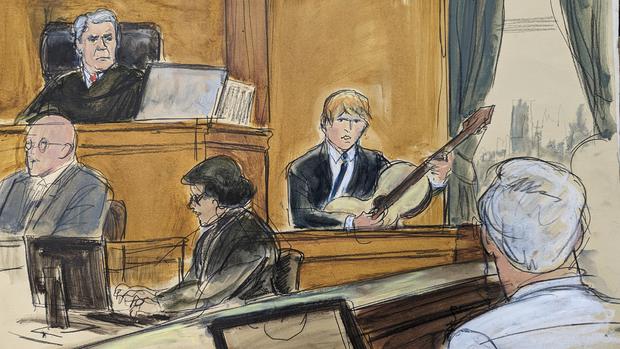Ed Sheeran said Monday he’s getting encouragement during his copyright trial from other performers who also worry that they’ll be sued as he battles claims that he stole material from Marvin Gaye’s “Let’s Get It On” to make a new tune a decade ago.
The British singer offered a spirited defense and a lot of singing during a second day on the witness stand after he was called by his lawyer to answer questions at a trial at which he is accused of infringing the copyrights of the 1973 soul classic Gaye created with fellow songwriter Ed Townsend.
From the witness stand, Sheeran used his guitar to perform a “mashup” of acoustic renditions of songs by other artists, including Nina Simone, Bill Withers, Blackstreet and Van Morrison, as well as some of his own. The demonstration intended to show how Sheeran can easily transition between his music and theirs.
John Minchillo / AP
Sheeran said he’s heard from other singers since the trial began last week because they share his worries about litigation resulting from their songwriting. He didn’t identify any of them, but said they’re cheering him on — grateful that he’s standing up against what all songwriters view as a threat to their work.
“When you write songs, somebody comes after you,” Sheeran said.
The trial, now in its second week, stems from a lawsuit filed by Townsend’s heirs several years ago, which seeks unspecified damages. Sheeran won a separate but similar lawsuit last year over his 2017 hit “Shape of You.” After that victory, Sheeran took to Instagram to discuss legal claims he said “were made with the idea that a settlement will be cheaper than taking it to court, even if there’s no basis for the claim.”
“It’s really damaging to the songwriting industry,” Sheeran said at the time. “There’s only so many notes and very few chords used in pop music.”
John Minchillo / AP
During an opening statement last week, Townsend attorney Ben Crump said a Zurich concert clip in which Sheeran can be heard segueing on stage between “Let’s Get It On” and the alleged offending song, “Thinking Out Loud,” amounted to “smoking gun” proof that Sheeran was violating copyrights.
Sheeran’s attorney, Ilene Farkas, countered Crump’s claim by providing the jury with a mini-concert Monday from her client, who cheerfully picked up a guitar from behind his witness chair whenever she asked him to demonstrate how he could switch from his song to somebody else’s and back again in a practice known as “mashups.”
He said he used the mashups to “spice it up a bit” during concerts, generally choosing songs that utilized similar chords.
“If it’s a love song, you might mash it up with another love song,” Sheeran said, suggesting that Elvis Presley’s version of “Can’t Help Falling in Love” or the Whitney Houston rendition of “I Will Always Love You,” written by Dolly Parton, would mash well with “Thinking Out Loud.”
At one point, Farkas asked her client if he copied anything from “Let’s Get It On” when he wrote his song.
Elizabeth Williams / AP
“No,” he said.
Sheeran expressed his admiration for Van Morrison, calling the Northern Irish singer “one of the most important influences in my life.”
He said his record label even referred to “Thinking Out Loud” as “the Van Morrison song.”
Sheeran’s good humor all but vanished when he faced cross examination as attorney Patrick Frank asked him about testimony from an expert witness.
“If I can be honest, I think what he’s doing here is criminal,” the singer said.
Sheeran didn’t hide how irritating he found it that his life of music had landed him in a witness chair.
Sheeran said he couldn’t believe that somebody would listen to one of his songs and then “diminish it by saying I stole it.”
He added: “I find it really insulting.”


